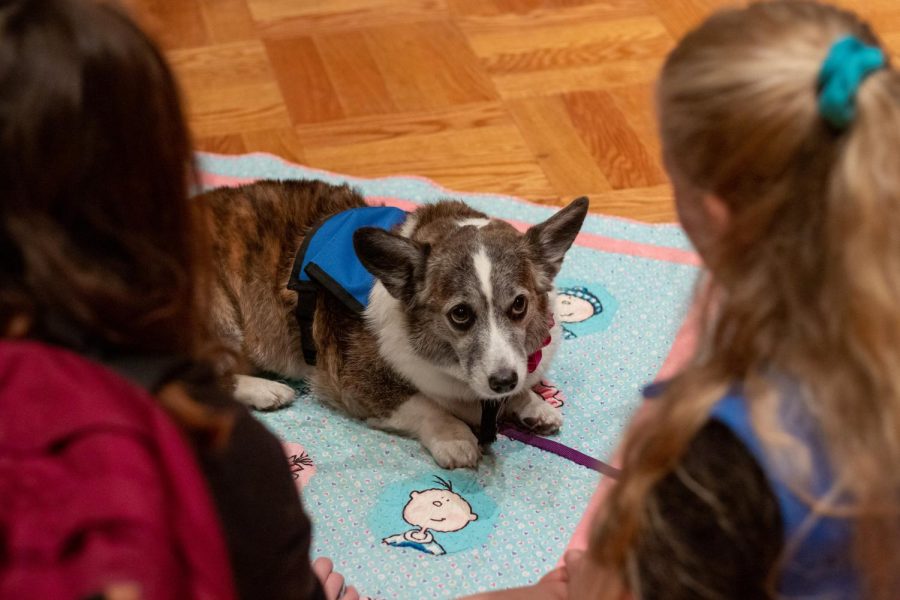Students are not the only ones working hard at the University of Massachusetts. You’ve seen them around campus, walking through the dining halls, patiently listening to lectures and quietly trotting around the library. Service dogs are constantly at work, training every minute of every day to ultimately become certified to help individuals with disabilities or specific needs. It might not always be evident, however, just how much work and patience is required on the trainer’s part.
At the start of my freshman year, I began to notice numerous dogs on campus wearing harnesses that said “SERVICE DOG IN TRAINING.” With my great love of animals and knack for teaching my own dogs tricks, a service dog training program seemed like the perfect fit for me and I immediately wanted to get involved.
I attended an orientation in the spring to become a relief foster for Diggity Dogs Service Dogs, Inc. based in Greenfield, Massachusetts. Alongside students from Smith College, Mount Holyoke College, Amherst College and UMass, I was taught a variety of commands and instructions that are used when training the dogs to sit, lay down and walk. The program leaders also discussed important information regarding the health and emotional well-being of dogs, such as their extreme sense of smell yet limited sight capabilities, physical signs of distress and methods of comforting them when in new or unusual environments.
Once I became a certified relief foster, I was then able to help train and take care of service dogs when their full-time fosters were unable. My first few experiences were intimidating, as I feared I would not be able to remember all of the commands and instructions, let alone easily navigate my busy schedule and crowded lecture halls with an animal by my side. I was quickly put at ease when the welcoming community of relief and full-time fosters offered tips and reminders and reviewed commands and instructions, helping me become a better foster with each training experience.
Throughout my training career I have gained an immense appreciation for all of the work, patience and focus that both fosters and dogs must have when working and training together. While the opportunity to have a dog by your side is comforting, it is also at times quite demanding. It requires complete dedication and focus to ensuring the safety of the dog, as well as paying constant attention to the dog’s every move and monitoring its training progress and development – all while managing full time studies.
Although being a relief or full-time foster might occasionally be somewhat tiring, it is one of the most beneficial and fulfilling experiences I have ever had and I think more students should take advantage of the opportunities service dog training programs have to offer. Becoming a relief foster for Diggity Dogs Service Dogs, Inc. has helped me be more cognizant of my surroundings and how they might affect the dog, have a greater sense of patience when teaching a dog to grasp a certain concept or command and become more organized with my schedule and schoolwork to ensure that I have enough time for both my studies and training.
Sarah Meikle, executive director at Diggity Dogs Service Dogs, Inc. finds that student fostering has many benefits.
“Impressively, most of our trainers also find that their grades improve when fostering. The process of managing and training a dog daily in addition to the many responsibilities the students have requires an impressive amount of maturity, consistency, time management skills [and] forethought and awareness, which ultimately positively affects the rest of their lives,” said Meikle.
Other programs around the United States have similarly found that training service dogs benefits both the dogs and the students, as dogs become immersed in their surroundings as they train while students develop a greater sense of organization, guidance and control.
Being part of the training community has also allowed me to make new connections with other students and become a more patient, cooperative and understanding person. I think more students should participate in service dog training programs such as Diggity Dogs Service Dogs, Inc. because I believe that this unique community service experience offers innumerable benefits to both the dog and the trainer, as well as giving a newfound independence to those in need.
“I have often found that students come to our program for the dogs, but stay for the community,” said Meikle. “Their efforts reverberate joy, hope and freedom through the lives of our clients and their loved ones for many years to come.”
McKenna Premus is a Collegian contributor and can be reached at [email protected] and followed on Twitter @mckenna_premus.



















